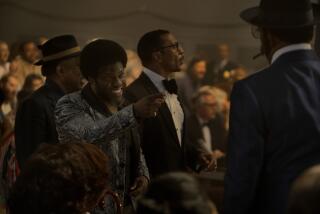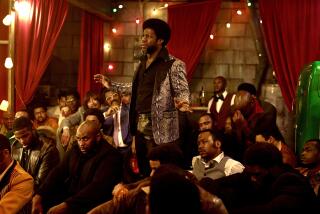A long-planned ‘Heist’
- Share via
Eddie Murphy had a simple suggestion about six years ago: Why not make an all-black version of “Ocean’s Eleven”?
Director Brett Ratner and producer Brian Grazer loved the comedian’s idea, and before long, the trio was throwing around ideas about who could star opposite Murphy: Jamie Foxx, Dave Chappelle, Chris Rock, Tracy Morgan and Chris Tucker headed the list.
The resulting movie, Universal Pictures’ “Tower Heist,” arrives in theaters this weekend, where it will face solid competition from Warner Bros.’ “A Very Harold & Kumar 3D Christmas.” But after more than five years of development, Murphy’s original pitch has been transformed into a different film, with the all-black conceit replaced by an ensemble cast led by Ben Stiller and including Casey Affleck and Matthew Broderick.
While Murphy still has a prominent role in “Tower Heist,” as does African American actress Gabourey Sidibe (“Precious”), the movie’s basic story also has changed, with the story’s original villain (imagine Donald Trump) replaced by a Bernie Madoff-type character.
The evolution of “Tower Heist” illustrates how even a seemingly straightforward idea can go through countless iterations from concept to screen. While “Tower Heist” is credited to screenwriters Ted Griffin (“Ocean’s Eleven”), Jeff Nathanson (Ratner’s last two “Rush Hour” movies) and writing partners Adam Cooper and Bill Collage (“Accepted”), the script also was revised by Russell Gewirtz (“Inside Man”), Rawson Marshall Thurber (“Dodgeball”), Leslie Dixon (“The Thomas Crown Affair”) and Noah Baumbach (“The Squid and the Whale”).
Universal hopes that the PG-13 “Tower Heist,” which cost about $75 million after tax rebates, will play strongly for several weeks, but the release calendar is crowded. Audience tracking surveys show that the studio’s marketing efforts have sparked significant interest among older women, but “Harold & Kumar” is appealing more strongly to younger men. Both films will face three new wide releases next weekend: Clint Eastwood and Leonardo DiCaprio’s “J. Edgar,” the sword-and-sandals drama “Immortals” and Adam Sandler’s cross-dressing comedy “Jack and Jill.”
In its long path to the screen, “Tower Heist” remained organized around the same basic idea: a group of thieves tries to steal money from a rich man who lives in a ritzy New York high-rise. But the very thing that made Murphy’s idea intriguing — the all-black cast — was ditched years ago. The filmmakers say it wasn’t Murphy’s recent flops (including “Meet Dave” and “Imagine That”) that prompted that change but, rather, a desire for authenticity: A modern apartment building would have an ethnically diverse staff.
As the film’s racial profile changed, another question loomed over the production: Who are these bandits, and what is their motivation? The earliest plot held that the protagonists worked in a building owned by someone like Trump. “It was a fun movie, a classic underdog story,” Ratner said. “But the problem was, you couldn’t distinguish the characters apart.” Even more knotty, it wasn’t clear what provoked their thievery.
After two and a half years of screenplay revisions, Ratner called up Griffin, with whom Ratner collaborated on “Ocean’s Eleven” before Steven Soderbergh replaced Ratner as that film’s director.
“I have good news and bad news,” Ratner recalled Griffin telling him. “The good news is that I am going to do this. The bad news is that I’m going to throw away your script.”
In reading the “Tower Heist” screenplay he inherited, Griffin said he was stumped by a fundamental question. “I couldn’t figure out a motivation for the heist other than profit,” Griffin said. “There was no reason to do the heist.”
Then Madoff’s massive Ponzi scheme hit the news. “It provoked this idea — you could pull off this heist if you have the world’s most hated man living in your penthouse,” Griffin said. In Griffin’s rewrite, the Madoff character (called Arthur Shaw and played by Alan Alda) has looted the pension fund of the high-rise’s staff and has hidden some of the proceeds in his penthouse.
Ratner said by the time Griffin finished his draft in summer 2009, the senior management at Universal Pictures (who have since left the studio) had cooled on the project, having spent several million dollars on a screenplay that they felt was still not ready to film. But Ratner wanted to spend even more, believing that Nathanson could push the “Tower Heist” script over the finish line. “He’s not cheap, but he’s a closer,” Ratner said of his “Rush Hour” collaborator.
When Universal balked, Grazer said his Imagine Entertainment would help pay Nathanson’s fee. “We wanted him so badly,” Grazer said.
The studio acceded, and in Nathanson’s hands “Tower Heist” became a bit more comic, and the key hotel staff members were fired from their jobs, meaning they not only had to break into Shaw’s apartment but also the building itself. Rather than open the film’s final act, the heist now begins earlier in the film, and Nathanson also added Sidibe’s comic part. “Eddie’s original idea was a comedic idea — guys who don’t know how to rob have to learn how to rob,” Nathanson said.
With Nathanson’s revisions in hand, Ratner visited Stiller on the set of “Little Fockers.” The actor said yes, but the tougher pitch was to Murphy, whose part — not to mention his original pitch — had been transformed. “It was still a movie about the haves and the have-nots,” said Grazer, who has produced a number of Murphy films, including “The Nutty Professor” and “Bowfinger.”
“My question was, would he still like the character we created for him?” Ratner said of Murphy. “My concern was, is he going to like this?” The answer was yes, and apparently Murphy was equally happy with the finished film. Next year, Murphy will host the Academy Awards, which Ratner is producing.
In that regard, more is at stake with “Tower Heist” than the film itself. If the Ratner-Murphy collaboration works, the “Tower Heist” momentum could give them both confidence to do at the Oscars what they do best — have fun and not take themselves too seriously. If the movie struggles to find an audience, the pair could enter the awards show defensively, which is rarely a good place to start.
More to Read
The biggest entertainment stories
Get our big stories about Hollywood, film, television, music, arts, culture and more right in your inbox as soon as they publish.
You may occasionally receive promotional content from the Los Angeles Times.











